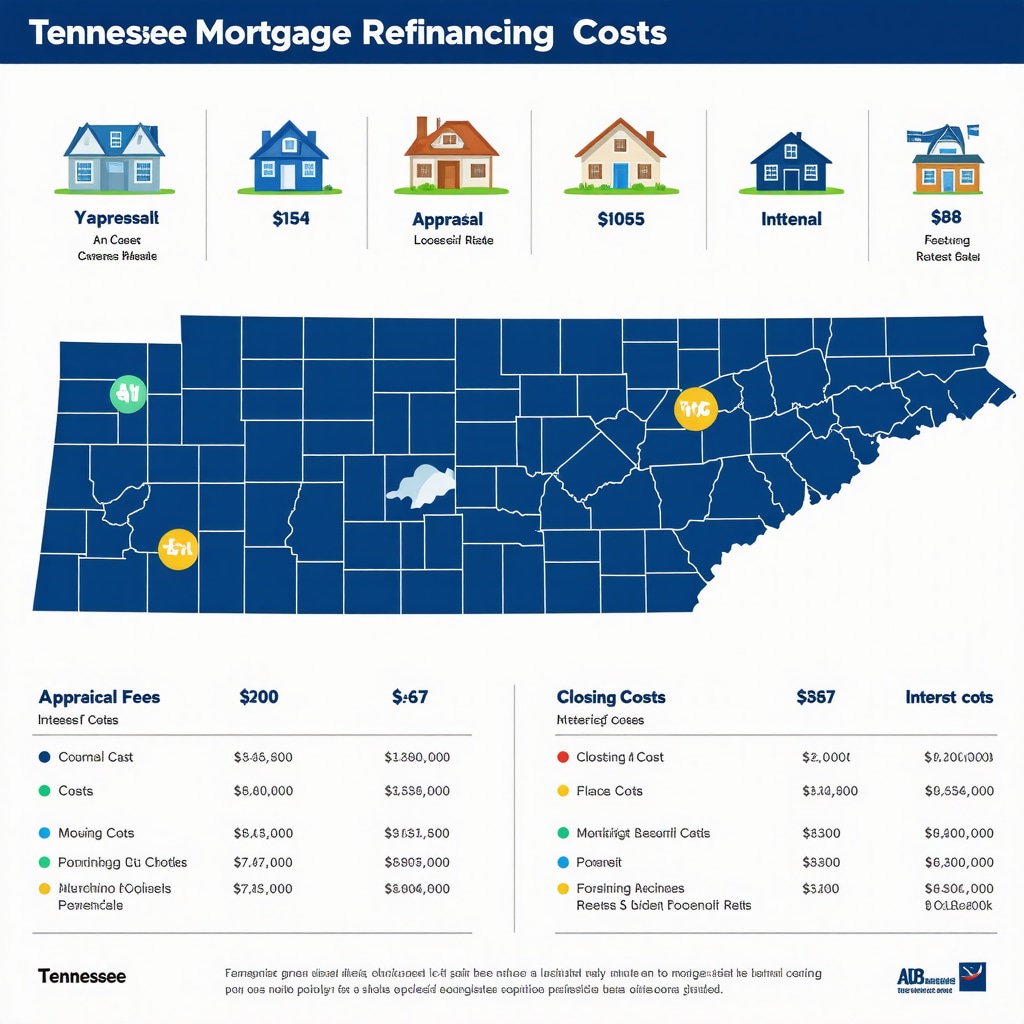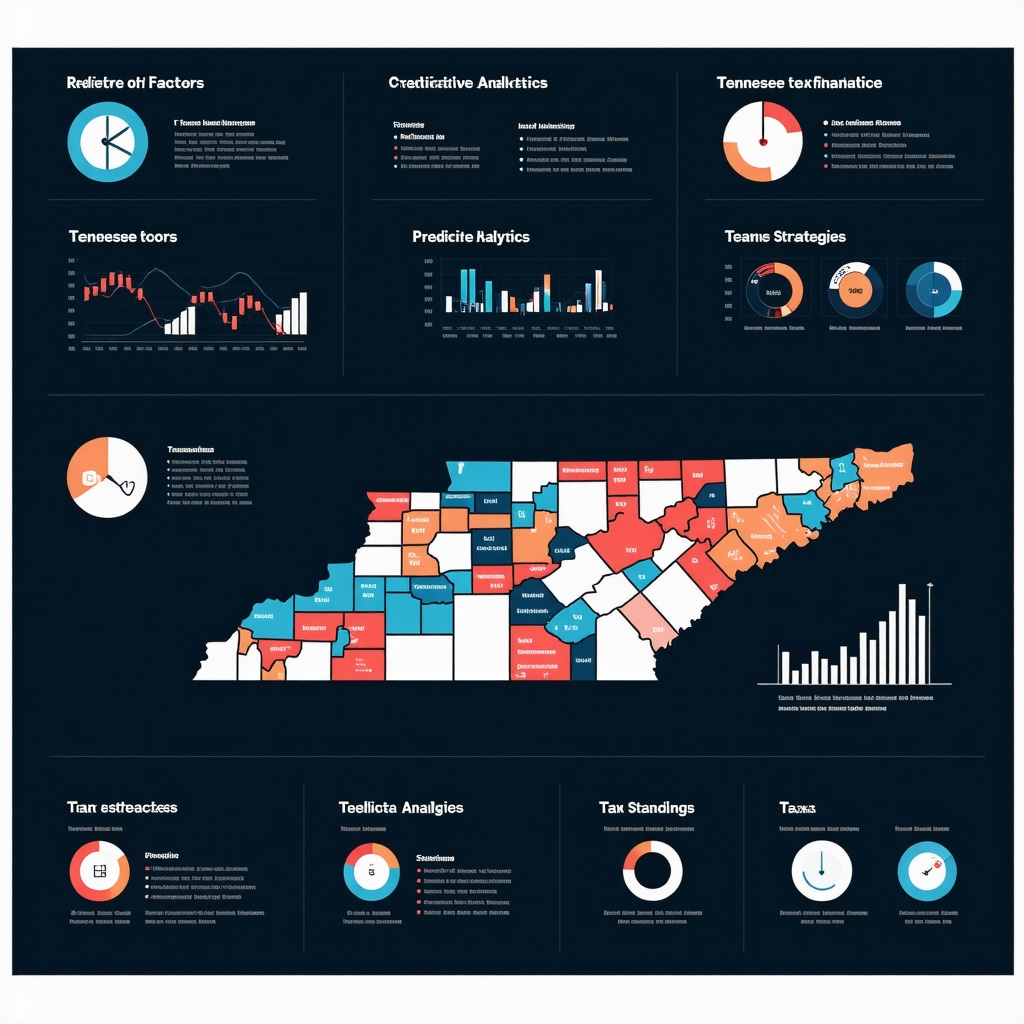When Tennessee Homeowners Should Really Consider Refinancing
Refinancing your home loan in Tennessee might sound like a dry financial chore, but it’s actually a savvy move that can save you thousands if timed right. Imagine this: a family in Nashville decided to refinance last fall when rates dipped, cutting their monthly payments and freeing up cash for a much-needed vacation. Stories like these aren’t just luck—they’re about knowing when and how to act.
Timing Is Everything: Riding the Waves of Refinance Rates
Mortgage rates fluctuate like the Tennessee River—sometimes calm, other times wild. The secret sauce to refinancing isn’t just about the lowest rate you see advertised; it’s about locking in that rate at the perfect moment. Tennessee’s local mortgage market is influenced by national trends but also by unique factors like regional economic shifts and state policy changes. For a detailed dive into when to lock in your refinance rates for maximum savings, exploring market trends is crucial.
Is Now Really the Right Time to Refinance Your Tennessee Home?
This question haunts many homeowners. A rule of thumb is to consider refinancing if you can reduce your interest rate by at least 0.5% to 1%. But there’s more—think about your long-term plans, your current loan terms, and closing costs. The Federal Reserve’s moves and inflation data also play starring roles in mortgage rate shifts, as noted by Federal Reserve monetary policy updates. And if you’re curious about how your credit score impacts those rates, this insightful guide on credit scores and mortgage rates is a must-read.
How to Refinance Like a Tennessee Pro: Smart Strategies for Maximum Savings
Beyond timing, the how of refinancing is equally important. Selecting the right lender and loan type can mean the difference between a great deal and a financial headache. Many Tennesseans find that working with local mortgage brokers can offer personalized advice and competitive rates, as they understand the nuances of regional markets. For guidance on navigating fixed versus adjustable options, check out this expert guide.
And here’s a tip—if your credit score needs a boost before refinancing, there are proven ways to improve it, which can unlock lower interest rates and better loan terms. Explore effective methods in this credit improvement guide.
Considering refinancing? Share your experiences or questions below! Engaging with fellow Tennesseans can provide new perspectives and maybe even a tip or two to save more.
Decoding Tennessee Refinancing Costs: What Homeowners Often Overlook
When it comes to refinancing, it’s easy to get caught up in the allure of lower interest rates and monthly payments. However, savvy Tennessee homeowners know that closing costs, appraisal fees, and potential prepayment penalties can subtly erode those anticipated savings. Understanding these expenses upfront is critical. For example, appraisal fees in Tennessee can vary widely depending on the county and property type, sometimes making a significant dent in your refinancing budget. Some lenders offer “no-closing-cost” refinance options, but these often come with trade-offs such as slightly higher interest rates or rolled-in fees. Being aware of these nuances helps you make informed decisions that truly benefit your financial health.
Leveraging Tennessee’s Local Market Trends to Your Refinancing Advantage
While national economic indicators certainly influence mortgage rates, Tennessee’s unique market dynamics also play a pivotal role. Local inventory levels, employment rates, and regional development projects can cause mortgage rates to fluctuate differently than the national average. Take, for instance, the ongoing growth in Nashville’s tech sector, which is driving demand and influencing loan availability and terms. Keeping an eye on these local trends, as discussed in this detailed Tennessee market insight, can empower you to time your refinance more strategically.
How Can Tennessee Homeowners Optimize Refinance Timing Amid Market Volatility?
This question challenges even experienced borrowers. The reality is that no one can predict exact rate movements, but preparing for fluctuations is possible. Consider setting up rate alerts with trusted mortgage brokers who specialize in Tennessee markets—they can notify you when rates dip to your target range. Additionally, understanding your personal financial timeline—whether you plan to stay in your home long-term or anticipate selling—can influence whether an adjustable-rate refinance or a fixed-rate loan makes more sense. Engaging with resources like our expert guide on fixed versus adjustable mortgage rates provides clarity on this decision.
The Impact of Credit Nuances on Tennessee Refinance Rates: Beyond the Basics
While a higher credit score generally correlates with better refinance rates, lenders also consider factors like credit utilization, recent inquiries, and the age of your credit accounts. For Tennessee borrowers, improving these nuances can translate into tangible savings on interest rates and loan terms. For instance, a borrower who reduced credit card balances and avoided new debt just before applying for refinancing saw a notable drop in offered rates. Detailed strategies for credit enhancement tailored for Tennessee residents are available in this comprehensive credit improvement guide.
Exploring these deeper financial considerations can significantly influence the success of your refinance. If you have questions or want to share your experience, please comment below—your insights could help fellow Tennesseans make smarter refinancing choices.
For further reading on the nuances of refinancing and market insights, visit our refinance timing resource or reach out through our contact page for personalized advice.
External Reference: Federal Reserve’s comprehensive updates on monetary policy provide key context for understanding mortgage rate movements nationwide, accessible at Federal Reserve Monetary Policy.

Unraveling Complex Credit Factors: Beyond the Score in Tennessee Refinancing
While a robust credit score is the cornerstone of securing favorable refinance rates, Tennessee homeowners should delve deeper into the intricate web of credit nuances that lenders scrutinize. Beyond the numeric score, factors such as credit mix, recent credit inquiries, and the longevity of credit accounts can significantly sway loan terms. For instance, a borrower with a diversified credit portfolio and minimal recent inquiries is often perceived as lower risk, resulting in better interest rates. It’s also critical to understand the temporal impact of financial behaviors—recently paid-off debts or changes in credit utilization can take weeks or even months to reflect positively in your credit profile.
One often overlooked aspect is the timing of your refinance application relative to your credit activities. Strategic planning, such as delaying new credit applications until after refinancing or consolidating debts beforehand, can optimize your credit profile. Tennessee-specific credit strategies, considering regional lending tendencies, are detailed in this comprehensive guide, offering actionable insights tailored to local borrowers.
How does the age of credit accounts influence Tennessee refinance rates?
The age of your credit accounts plays a subtle yet pivotal role in refinance approvals. Lenders view longer-standing credit histories as indicators of financial responsibility and stability. In Tennessee, where lenders may weigh local economic factors alongside credit history, a mature credit profile can tip the scales in your favor. Conversely, recently opened accounts can signal higher risk, potentially increasing your refinance rate. Maintaining older accounts open and in good standing—even if not actively used—can thus be a strategic move ahead of refinancing.
Harnessing Advanced Market Intelligence: Predictive Insights for Refinancing in Tennessee
Recent advancements in predictive analytics and machine learning have begun to permeate mortgage lending, offering Tennessee homeowners a novel edge. By analyzing vast datasets encompassing local economic indicators, employment trends, and housing market dynamics, these technologies forecast interest rate movements with increasing accuracy. Engaging with lenders or brokers who utilize such tools can provide real-time alerts tailored to your financial profile and Tennessee’s unique market conditions.
Moreover, understanding the interplay between state-level policy shifts—such as tax incentives for homeownership or infrastructure projects—and mortgage rates can enhance timing strategies. For instance, upcoming large-scale developments in the Memphis metropolitan area might influence lender risk assessments and loan availability. Staying informed through resources like this detailed Tennessee market insight empowers homeowners to anticipate and capitalize on these subtle market signals.
Integrating Refinancing with Long-Term Financial Planning: A Holistic Tennessee Approach
Refinancing is not merely a transactional event but a strategic component of comprehensive financial planning. Tennessee homeowners should evaluate refinancing within the broader context of retirement goals, investment diversification, and tax implications. For example, refinancing to a shorter-term loan might increase monthly payments but significantly reduce overall interest, aligning with a strategy to build equity faster for future financial leverage.
Additionally, considering the tax ramifications—such as mortgage interest deductions and their evolving federal treatment—is crucial. Consulting with financial advisors familiar with Tennessee’s tax landscape can uncover opportunities to optimize your refinance benefits beyond immediate savings.
Ready to dive deeper into advanced refinancing strategies tailored for Tennessee? Explore our expert resources or connect with local mortgage professionals who specialize in integrating refinance decisions within holistic financial plans.
Decoding the Subtle Influence of Credit Mix and Activity on Tennessee Refinance Rates
While the headline credit score often dominates refinancing conversations, Tennessee homeowners seeking the best mortgage rates must appreciate the subtle yet impactful influence of credit mix and recent credit activity. Lenders assess not only your score but also the diversity of your credit accounts—credit cards, installment loans, and mortgages—to gauge risk. For example, a well-balanced credit portfolio with a history of timely payments across different account types signals reliability, often translating into more favorable refinance terms. Conversely, recent credit inquiries or opening multiple new accounts before refinancing can raise red flags, potentially resulting in higher interest rates. Navigating these nuances requires strategic timing and disciplined credit management, as detailed in our insightful guide on credit scores and mortgage rates.
How do recent credit inquiries and utilization shifts uniquely affect Tennessee refinance approvals?
Recent credit inquiries and fluctuating credit utilization ratios wield significant influence over refinance approvals in Tennessee’s lending landscape. When lenders see a flurry of inquiries, they may interpret it as financial distress or increased risk, causing them to tighten loan terms or raise rates. Similarly, sudden spikes in credit utilization—even if temporary—can lower your effective credit score as perceived by automated underwriting systems. Tennessee borrowers have reported that timing refinance applications to avoid such credit activity windows can yield noticeably better rates. For a deeper dive into tactical credit management tailored for Tennessee homeowners, explore this comprehensive credit improvement guide.
Harnessing Predictive Analytics to Anticipate Tennessee Mortgage Rate Movements
The integration of predictive analytics into mortgage lending is revolutionizing how Tennessee borrowers approach refinancing. By leveraging machine learning models that analyze local economic data, employment trends, and housing market indicators, lenders can forecast rate movements with increasing precision. Tennessee’s evolving markets—such as the booming Nashville tech corridor or Memphis’s infrastructural developments—feed into these models, offering nuanced forecasts unseen in traditional rate analyses. Engaging with mortgage professionals who adopt these advanced analytics can provide homeowners with timely, data-driven rate lock alerts that align with their financial goals. For context on local market dynamics influencing these forecasts, consult this detailed Tennessee market insight.

Integrating Refinancing Decisions into Broader Financial and Tax Strategies in Tennessee
Refinancing transcends mere interest rate considerations; it’s a pivotal element within a homeowner’s broader financial and tax planning framework. Tennessee residents should evaluate how refinancing choices—such as opting for shorter loan terms or cash-out refinances—interact with retirement planning, investment strategies, and evolving tax laws. For instance, while mortgage interest deductions remain beneficial, recent federal tax reforms have altered their scope, making personalized financial advice indispensable. Collaborating with advisors conversant in Tennessee’s tax landscape can unveil refinancing strategies that optimize long-term wealth accumulation beyond immediate savings. To explore how fixed versus adjustable mortgage options fit into these plans, visit our expert guide.
What advanced tax considerations should Tennessee homeowners weigh when refinancing?
Understanding the intersection of refinancing and tax implications requires a sophisticated lens. Tennessee homeowners must consider factors such as the impact of refinancing on mortgage interest deductions, potential capital gains tax consequences if refinancing funds are used for home improvements, and state-specific property tax assessments that might be affected by changes in loan structure. Especially with recent shifts in federal tax policies, it’s crucial to analyze whether the anticipated monthly savings justify the loss of certain tax benefits or trigger unforeseen liabilities. The IRS Publication 936 on Home Mortgage Interest Deduction offers authoritative guidance, but consulting a tax professional familiar with Tennessee’s nuances is highly recommended.
Refinancing is a multifaceted decision layered with credit intricacies, market intelligence, and financial planning. We invite Tennessee homeowners to share their experiences or questions below to foster a community of informed borrowers. For personalized support, don’t hesitate to reach out to our local mortgage experts who specialize in crafting tailored refinance strategies.
Expert Insights & Advanced Considerations
Leveraging Predictive Analytics for Timing Refinances
Mortgage lenders and brokers increasingly rely on machine learning models that analyze Tennessee’s unique economic indicators, including employment trends and regional development projects. Utilizing these predictive analytics tools can help homeowners anticipate favorable refinance windows and lock in lower rates ahead of market shifts, a strategic advantage especially relevant in dynamic markets like Nashville and Memphis. Engaging with professionals versed in these technologies is crucial for maximizing refinance benefits.
The Nuanced Impact of Credit Mix and Activity Beyond the Score
While credit scores remain fundamental, lenders in Tennessee also scrutinize the composition of your credit portfolio and recent credit behaviors. A diversified credit mix combined with minimal recent inquiries signals lower risk, often translating to better refinance terms. Conversely, opening multiple accounts or sudden spikes in credit utilization shortly before refinancing applications can cause rate increases. Strategic credit management tailored to Tennessee’s lending environment can unlock significant savings.
Integrating Refinance Decisions within Holistic Financial and Tax Planning
Refinancing should be viewed as a component of broader financial strategies, including retirement planning, investment goals, and tax considerations. Tennessee homeowners must weigh factors such as the evolving federal mortgage interest deduction rules, potential capital gains implications, and state-specific property tax effects. Collaborating with financial and tax advisors familiar with Tennessee’s landscape ensures refinancing choices support long-term wealth accumulation rather than just short-term savings.
The Subtle Influence of Loan Type Selection on Refinancing Outcomes
Choosing between fixed and adjustable-rate mortgages is more than a preference; it significantly affects refinance success. Tennessee’s market fluctuations and personal financial timelines dictate which loan type optimally balances risk and cost. Fixed-rate loans offer stability amidst volatility, while adjustable rates may provide initial savings but require careful management. Expert guides like our fixed versus adjustable mortgage rates guide provide valuable frameworks for these decisions.
Curated Expert Resources
- Federal Reserve Monetary Policy Updates: Authoritative insights into nationwide economic policies influencing mortgage rates, essential for understanding broader market movements impacting Tennessee homeowners. (Federal Reserve Monetary Policy)
- Tennessee Mortgage Rates Local Market Insight: Detailed analyses of regional market trends, including employment and housing sector developments impacting refinance rates. (Local Mortgage Markets in Tennessee)
- Comprehensive Credit Improvement Guide: Tailored strategies for Tennessee homeowners to optimize credit profiles beyond simple scores, enhancing refinance eligibility and terms. (Credit Improvement Guide)
- Expert Fixed vs Adjustable Mortgage Rates Guide: In-depth comparison to aid Tennessee borrowers in selecting ideal loan types aligned with personal financial goals and market conditions. (Navigating Fixed vs Adjustable Mortgage Rates)
- Personalized Mortgage Advice and Consultation: Direct access to seasoned Tennessee mortgage professionals who provide customized refinancing strategies and market timing assistance. (Contact Local Mortgage Experts)
Final Expert Perspective
Refinancing your Tennessee home in 2025 transcends simple interest rate comparisons; it demands a sophisticated understanding of credit nuances, predictive market analytics, and integration with broader financial planning. Embracing advanced strategies—such as leveraging data-driven timing, optimizing credit mix, and aligning loan selection with long-term goals—enables homeowners to unlock meaningful savings and financial resilience. We encourage Tennessee homeowners ready to refine their approach to explore the expert resources above, engage with local mortgage specialists, and share insights to foster a community of informed, empowered borrowers prepared to navigate the complex refinance landscape.

